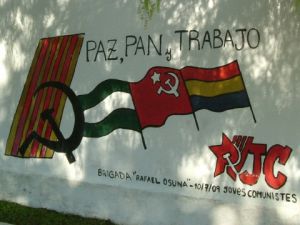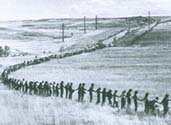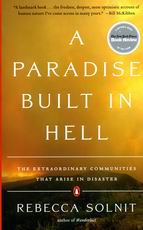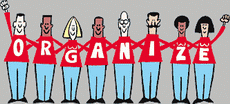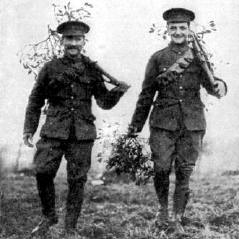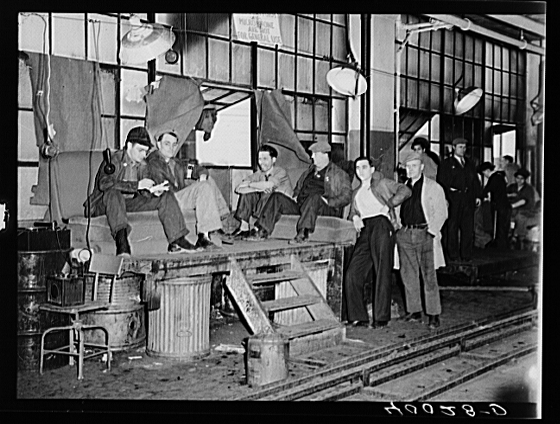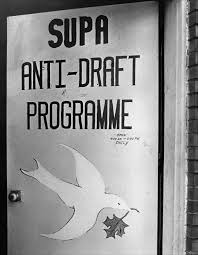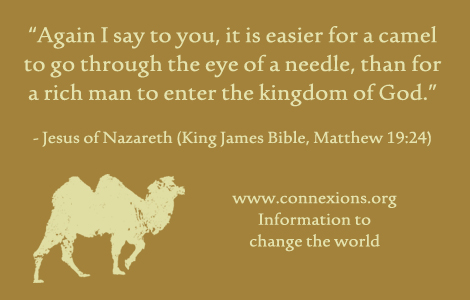If you're having trouble viewing this message, open it in a browser window.
|
|
|
|
|
|
Other Voices: The Connexions Newsletter
December 19, 2015
This issue: Utopias
“A map of the world that does not
include Utopia,” said Oscar Wilde, “is not worth even glancing at, for
it leaves out the one country at which Humanity is always landing. And
when Humanity lands there, it looks out, and, seeing a better country,
sets sail.”
Utopian visions, be they practical
or not, free our imaginations, if only for a little while, from the
daily grind of struggle and worry, and allow us to dream about the kind
of world we would hope to live in. Such dreams can inspire us and guide
us, even if they are not always quite practical.
Friedrich Engels appreciated this
quality in the writings of Charles Fourier (1772-1837), the French
utopian socialist who imagined a future in which men and women would be
free and fully equal, and in which, so he speculated, there would be six
moons orbiting the earth and the salt water of the oceans would be
replaced with lemonade. Engels, practical-minded revolutionary though he
was – and one who preferred beer to lemonade -- wrote that he would
much rather read Fourier’s “cheerful fantasies” than the gloomy writings
of social critics “where there is no lemonade at all.”
This issue of Other Voices peers into the world of utopian visions, practical or otherwise: our topic of the week is Utopias. You’ll also find a potpourri of other articles, books, resources and songs to stimulate your thinking and your imagination.
As always, we invite you to share
this newsletter with your friends. You can forward this email, or send
them the link to the Other Voices home page on the Connexions website at
www.connexions.org/Media/CxNewsletter.htm.
Your feedback is appreciated - and so are donations to keep us doing what we're doing!
If you'd like to subscribe and receive this newsletter by email every two week, please use this form.

|
|
Topic of the Week: Utopias
The Connexions Library features a kaleidoscopic collection of
writings on utopian topics, ranging from speculative fantasies to
practical attempts at building alternatives communities, and also
including hard-headed anti-utopian critiques and grim dystopias. Explore
them here.
|
|
|
How to Change Everything
Alyssa Battisoni says that Naomi Klein’s This Changes Everything
is a vital book whose limitations should spark discussion about where
we go from here. “There is a lot of work to do. And so everyone on the
Left should read This Changes Everything, argue about it, and take
seriously its injunction to think through the implications of climate
change for our programs and projects. As we plot a new way forward, our
aims cannot be nostalgic or timid. Now more than ever the stakes of
politics feel as high as they can be.” Read more
Keywords: Climate Change - Ecosocialism
|
|
|
Catch your dreams – Utopia is possible!
Amid Spain's general depression, Marinaleda - an Andalucian
town sometimes dubbed the 'communist utopia' - is bucking the moribund
trend with a mixture of direct action, community-level democracy,
cooperation and mutual aid. “While capitalism frames our relationships
as a series of self-interested economic transactions, Marinaleda relies
on a model of mutual aid, as locals work together to meet shared needs,
with far less money circulating. While it can be easy to forget, money
is simply a way of facilitating action, which creates an incentive for
people to do tasks that they otherwise may not have any interest in
doing. Direct action, on the other hand, is rooted in common interests
and explores the practicalities of what needs doing, based on who is
there to do it.” Read more
Keywords: Economic Alternatives - Mutual Aid
|
|
|
The Arc of Justice and the Long Run: Hope, History, and Unpredictability
Rebecca Solnit writes: “North American cicada nymphs live
underground for 17 years before they emerge as adults. Many seeds stay
dormant far longer than that before some disturbance makes them
germinate. Some trees bear fruit long after the people who have planted
them have died, and one Massachusetts pear tree, planted by a Puritan in
1630, is still bearing fruit far sweeter than most of what those
fundamentalists brought to this continent. Sometimes cause and effect
are centuries apart; sometimes Martin Luther King’s arc of the moral
universe that bends toward justice is so long few see its curve;
sometimes hope lies not in looking forward but backward to study the
line of that arc.” Read more
Keywords: Transformations - Resistance
|
|
|
How Class Kills
A recent study showing rising mortality rates among middle-aged
whites in the United States drives home the lethality of class
inequality. Case and Deaton's study complements a larger literature
demonstrating that health inequality along class lines -- approximated
by socio-economic indicators like income and education -- is rising.
With the historic rise in economic inequality, there has been an
attendant increase in health inequality. Read more
Keywords: Health & Class - Race & Class
|
|
|
Book of the Week: A Paradise Built in Hell: The Extraordinary Communities That Arise in Disaster
By Rebecca Solnit
The
most startling thing about disasters, according to Rebecca Solnit, is
not merely that so many people rise to the occasion, but that they do so
with joy. That joy reveals an ordinarily unmet yearning for community,
purposefulness, and meaningful work that disaster often provides.
According to
Solnit, “Utopia is in trouble these days. Many no longer believe that a
better world, as opposed to a better life, is possible, and the rhetoric
of private well-being trumps public good, at least in the
English-speaking world.... ‘There is no alternative,’ the conservative
prime minister Margaret Thatcher liked to say, but there is, and it
appears where it is least expected, as well as where it is most
diligently cultivated. Changing the world is the other way to imagine
salvaging the self – and others, for the utopian impulse is generous
even when it’s wrongheaded. And utopias of sorts arise in the present,
in Argentina, in Mexico, in countless social, economic, and agricultural
experiments in Europe, in India, and in the United States; among, other
places. The map of utopias is cluttered nowadays with experiments by
other names, and the very idea is expanding. It needs to open up a
little more to contain disaster communities. These remarkable societies
suggest that, just as many machines reset themselves to their original
settings after a power outage, so human beings reset themselves to
something altruistic, communitarian, resourceful, and imaginative after a
disaster, that we revert to something we already know how to do. The
possibility of paradise is already within us as a default setting.” Read more
|

|
|
Film of the Week
The Living Seed
Testimonies of farmers, seed
savers, agronomists and scientists from across India and abroad form the
basis for their compelling investigation of GMOs, organic farming and
the future of agriculture. See more
Keywords: GMOs - Seeds
|
|
|
Organizing
A Strategy for Antiwar Organizing
According to David Grosser, “anyone
concerned with re-building the antiwar movement in the United States
should make their highest priority developing a realistic strategy to
organize those unorganized and inactive millions. The converse is also
true. Without an organizing effort that reaches those new people and
builds for the long haul, we don't have a prayer of defeating the most
massive war machine in history. We desperately need an unsparing
evaluation of past efforts and a sober strategy equal to the enormity of
the tasks ahead.... It’s time to face the hard facts -- exclusive
reliance on mass demos has failed. Please don’t misunderstand: I am not
saying that mass mobilizations are never an appropriate tactic. But they
are only a tactic, one among many that range from writing letters to
the editor to civil disobedience or a general strike. Tactics, mass
demos included, are a means to accomplish an end.” Read more
Keywords: Anti-War Movement - Organizing
|

|
|
People's History
The Christmas Truce, 1914
On Christmas
Day, 1914, in the first year of World War I, German, British and French
soldiers disobeyed their superiors and fraternized with "the enemy"
along two-thirds of the Western Front. German troops held Christmas
trees up out of the trenches with signs, "Merry Christmas." "You no
shoot, we no shoot." Thousands of troops streamed across no-man's land
strewn with rotting corpses. They sang Christmas carols, exchanged
photographs of loved ones back home, shared rations, played football,
even roasted some pigs. Soldiers embraced men they had been trying to
kill a few short hours before. They agreed to warn each other if the top
brass forced them to fire their weapons, and to aim high. A shudder ran
through the high command on either side. Here was disaster in the
making: soldiers declaring their brotherhood with each other and
refusing to fight. Read more
Keywords: Christmas - Soldiers
|
|
|
The Flint Sit-Down Strike
The Sit-Down
Strike at General Motor's Flint, Michigan Fisher Body and Chevrolet
plants (which began on December 30, 1936) was a turning point in the
history of the American labour movement. The United Automobile Workers
(UAW- CIO) had won strikes and union recognition in individual auto
plants and from smaller parts and auto manufacturers. The Flint strike,
however, won its first national contract with a major producer: General
Motors, at the time, the world's largest industrial corporation. The
1937 sitdown strikes were a thunderbolt that shattered labour-management
relations. The victory of the Flint auto workers heralded the most
profound social changes in the United States since the Civil War. It
changed every aspect of social, cultural and political life in America. Read more
Keywords: Factory Occupations - Sit-downs/Sit-ins
|
|
|
SUPA – Student Union for Peace Action
The
founding meeting of the Student Union for Peace Action (SUPA) took
place in Regina from December 28, 1964 to January 1, 1965. The
organization emerged out of the remains of the Combined Universities
Campaign for Nuclear Disarmament (CUCND). SUPA quickly established a
nationwide organization operating on university campuses, coordinating
community projects, alternative publications and summer youth programs.
The group existed from 1964 to 1967 with branches in British Columbia,
Saskatchewan, Ontario, Quebec and other regions. Many individuals
involved with SUPA went on to join other organizations such as the CYC
(Company of Young Canadians) the CUS (Canadian Union of Students) and
the SDU (Students for a Democratic University) among several others.
Comprised mainly of young Canadians, SUPA sought to establish a grass
roots initiative focusing on important social and political issues.
Check out Connexipedia to learn more about SUPA
Keywords: New Left - Peace Movement
|

|
|
In Ale Gasn - Revolutionary Yidish Anthem
A Yiddish song about the political struggles of Jewish socialists,
communists, and anarchists, in Russia and Poland in the latter part of
the 19th century and the beginning of the 20th century. It opposes the
Russian ruling class and, especially, Russia's police. Performed by the
Workmen's Circle chorus. Listen here
|
Your support is needed to keep Connexions going
All of the
work of the Connexions project is done by volunteers, but our expenses
include rent, phone and computer costs and technical support, as well as
expenses related to our ongoing project of converting printed archival
materials into digital formats. You can make a one time or regular
monthly contribution through the donate page on the Connexions website.
|
Bequests
Many of us have made working for
social justice a lifetime commitment. If you are thinking about leaving
a legacy for social justice that will live on, you might want to
consider leaving a bequest to Connexions in your will. If you'd like to
discuss this option, please contact us: Connexions Archive and Library,
Toronto, 416-964-5735 or
see the Bequest page..
|
International Human Solidarity Day
January 3 – 13, 2016
Witness Against Torture
January 14, 2016
Launching the Socialist Register 2016 – The Politics of the Right
January 24, 2016
Women Transforming Cities Grand Tea Party Cafe
January 27, 2016
International Day of Commemoration in Memory of the Victims of the Holocaust
The Connexions Calendar is an online calendar that exists to
advertise events that support social justice, democracy, human rights,
ecology, and other causes. We invite you to use it to promote your
events. Adding events to the Connexions Calendar is FREE. We'll give you
a username and password which you use to log on. Use the contact form to arrange for a username and password. Read more →
|
December 21, 1844
The first co-operative store
The Rochdale Society of Equitable Pioneers opens the first
co-operative store, in Rochdale, England. The society formulates the
Rochdale Principles, which set out the basic ideals and principles of
the co-operative movement, and which continue to form the basis on which
co-operatives around the world operate.
December 21, 1919
Red Scare deportations
The U.S. government deports 250 foreign-born radicals and suspected radicals, including Emma Goldman, and sends them to Russia.
December 24, 1906
Reginald Fessenden’s historic radio broadcast
Canadian inventor Reginald Fessenden (1866-1932) makes the
first-ever audio radio broadcast of music and speech. Up to that point,
only Morse code signals had been transmitted via radio waves. Fessenden
alerts radio operators on ships near the New England coast to listen for
a special transmission on December 24. When they tune in, they hear,
instead of the normal dots and dashes of Morse code, music and spoken
words. Fessenden begins his historic broadcast by playing a phonograph
record of Handel’s Ombra mai fu (Largo), which thereby becomes the first
piece of music ever broadcast.
December 26, 1992
Women in Black
In Belgrade, Women in Black begin a campaign against rape
during war, The Group for Women Raped in War. Volunteers assist the
survivors by providing basic needs, solidarity and sometimes counseling.
|

Trying to change the world? We can help.
Getting your story across can be an uphill battle when your group is challenging the status quo. Our partner organization SOURCES can help you get your message out. As a SOURCES
member, you have an array of media relation tools at your disposal to
promote your events, books, articles, videos, etc. as well as tools to
get you in contact with those who can help you achieve your goals. The SOURCES news release
service is especially valuable for groups wants to inform the media
(and the public) about their issues. For more information about Sources please click this link.
|
|
Follow us on twitter to stay up to date with company news and other information.
|
|
Like us on Facebook to keep up with our news, updates and other discussions.
|
|
|
Copyright
Connexions 2015. Contents are licensed under a Creative Commons
Attribution Non-Commercial License. This means you are welcome to share
and republish the contents of this newsletter as long as you credit
Connexions, and as long as you don’t charge for the content.
Other Voices: The Connexions Newsletter, is available online here
This issue was edited by Ulli Diemer.
Connexions
812A Bloor Street West, Suite 201
Toronto ON M6G 1L9 Canada
Phone: 416-964-5735
www.connexions.org
Enjoy this issue of Other Voices? Want to share with friends and family? Then we encourage you to share this link. All issues of OtherVoices are available on the Connexions website at www.connexions.org/Media/CxNewsletter.htm
If you don’t want to receive emails from us anymore, click here to unsubscribe.
|
|





